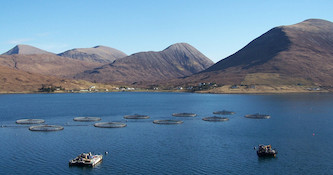The Scottish Greens said they have written to the Scottish Government’s Rural Affairs secretary Mairi Gougeon calling for urgent talks on tackling “problems” in Scotland’s massive salmon farming industry.
Scottish Greens’ Rural Affairs spokesperson Ariane Burgess MSP said “increasing numbers of farmed fish deaths, disease and suffering in Scotland’s waters are seeing conditions deteriorate amid delays in delivering hope for changes demanded by experts.”
The Scottish Greens said they have previously called for a moratorium on salmon farm expansions but agreed to work within the Scottish Government and industry on improvements as part of its power sharing agreement.
Burgess said communities and environmental campaigners are becoming “more and more frustrated” with what they see as a lack of progress and that now wants to put those concerns to the Minister.
Recent HMRC data analysed by trade body Salmon Scotland shows that for the first three quarters of 2023 to September there was a rise in Scottish salmon exports of £33 million to £478 million.
On a rolling annual basis, exports of Scottish salmon stood at £611 million – confirming Scottish salmon’s place as the UK’s top food export.
In the first nine months of the year, 53,000 tonnes of Scottish salmon were exported to more than 50 countries, enough for more than 250 million meals.
Farm-raised salmon directly employs 2,500 people in Scotland and a further 10,000 jobs are dependent on the sector.
In her letter, Burgess said: “I am writing to express the Scottish Green Parliamentary Group’s strong concern about the slow pace of reform of the fish farming industry.
“This is an important issue for our party members, constituents and environmental NGOs, and is a growing concern for the public.
“I trust that we can work together to deliver urgent, meaningful action required to address the environmental impacts of the industry and reduce fish farmed deaths, disease and suffering.”
Among key areas of concern she has raised, the Highlands and Islands MSP pointed to the possibility of removing exemptions for the aquaculture sector from the new National Planning Framework, “using a spatial plan to ensure sites cannot be established in unsuitable areas, and applying rules from environmental watchdog SEPA on all fish farms.”
Other issues in her letter concentrate on “minimising harm to wild salmon, strategic planning to avoid long term environmental damage, penalties and enforcement for licence breaches, and reducing chemicals and waste among others listed.”
Burgess said: ‘This programme has been delayed, and, given the deterioration of welfare and environmental standards that this year’s mortality rate in particular reflects, the commitments no longer appear to be adequate to the challenge at hand.”
